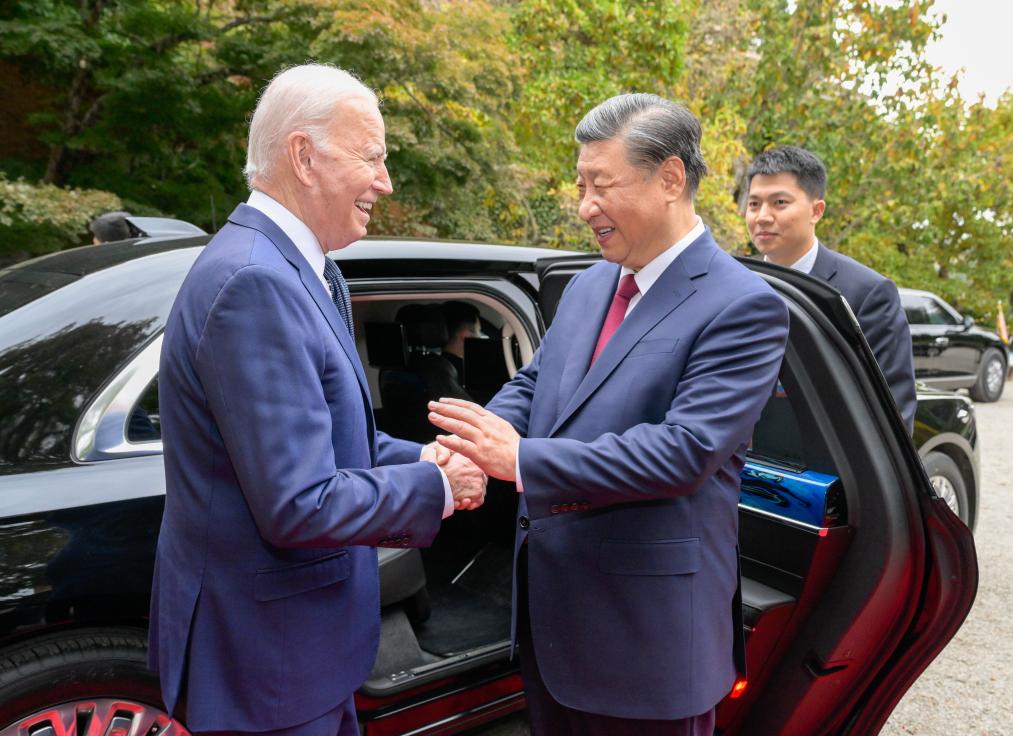Xi-Biden summit helps stabilize ties


President Xi Jinping and US President Joe Biden met in San Francisco, US, on Wednesday to discuss significant issues of concern to both countries. The meeting between the two heads of state attracted worldwide attention because, in the current turbulent international political and economic situation, the future direction of US-China relations is vital to world peace and development.
On Nov 15 last year, Xi and Biden held a summit meeting in Bali, Indonesia, and reached the critical"Bali consensus". The most important part was that the United States agreed to respect China's system and not seek to change it, not seek to revitalize alliances against China, not support "Taiwan independence", and not support "two Chinas" or "one China, one Taiwan". The US government is committed to the one-China policy. It does not seek to use the Taiwan question to contain China and hopes to see peace and stability across the Taiwan Strait. The US disclaims any intention of having a conflict with China, of "de-coupling" from China, halting China's economic development, or containing China. The two heads of state also agreed to maintain communication lines on diplomacy, economy and trade, climate, public health, agriculture and food security, and people-to-people and cultural exchanges.
Regrettably, over the past year, the US has not only failed to abide by the "Bali consensus", it has walked in the opposite direction, causing US-China relations to fall into a deep trough and having a highly detrimental impact on global stability and development.
Over the past year, the US has been very provocative with regard to Taiwan, Xinjiang, and Hong Kong. Allowing Taiwan leader Tsai Ing-wen to use border crossing as an excuse to meet with then US House Speaker Kevin McCarthy and the significant increase in sales and gifts of sophisticated weapons to Taiwan were particularly egregious maneuvers.
In the field of science and technology, the US and its allies have implemented a blockade on exports of high-end chips and high-end chip manufacturing tools to China to try to stifle China's high-tech development. The US and its allies continue to conduct military surveillance and provocations in the South China Sea. What is even more perilous is the US' attempt to "Nato-ize" the Indo-Pacific region, further threatening China's security and territorial integrity. The above are just a few of the hostile actions the US has taken against China, but they are enough to show that US-China relations have reached a stage of extreme tension.
However, in the past year, international developments have further underscored the trend of the "rising East". The political and economic clout of the Shanghai Cooperation Organization, the "Belt and Road" cooperation, and the BRICS mechanism continues to grow. China's influence in the Middle East, Central Asia, Southeast Asia and Latin America is constantly expanding. The concept of a "global community with a shared future" and the "Chinese modernization" model are gaining more and more say worldwide.
Even in technology, the launch of Huawei's new mobile phones and other products signifies that the US' blockade of high-tech to China is far from successful. Meanwhile, the US is mired in the conflicts in Ukraine and Gaza. The political and moral "soft power" of the US and the West in the international sphere, especially in the Arab world and the Islamic world, has diminished significantly, and they are increasingly isolated internationally. The US faces challenging economic, financial, social, and debt problems internally. The life-and-death struggle between the Democratic and Republican parties has nearly paralyzed governance in the US, causing domestic contradictions and divisions to accumulate and worsen.
Admittedly, China must also focus on economic development problems, inadequate domestic demand and financial stability. Still, compared with the issues faced by the US, China's problems are relatively manageable since China has the advantage of having the strong leadership of the Communist Party of China, a capable government, and the unity of the people.
For the US, although its basic strategy of containing and isolating China has not changed and is unlikely to change, there are enough incentives to stabilize US-China relations, at least in the short run, and restore or increase cooperation in some economic and trade areas.
This is because, first, the US wants to prevent itself from suffering losses because of any further deterioration in ties between the two countries; second, the US hopes to make slight concessions to China on non-crucial issues and obtain China's cooperation on economic, trade and financial matters; third, the US does not want to open up another US-China struggle front beside the already intractable conflicts in Ukraine and Gaza; and lastly, Biden understands that a stable Sino-US relationship serves the US interests in the fields of finance, economy, and people's livelihood, such as buying more US Treasury bonds and agricultural products. Under these incentives, the US has recently expressed some "goodwill" to China on some practical issues.
Insofar as the deterioration of US-China relations is concerned, the US has been on the offensive, with China on the defensive for a long while. Since China has never intended to be an enemy of the US, it has only adopted some appropriate countermeasures in a restrained and prudent manner to show its displeasure with US hostilities and tried strenuously to avoid full-scale confrontation. Therefore, when the "goodwill" of the US came recently, and "suddenly", China responded appropriately and positively, hoping that the US would be less hostile to China in the future, thereby allowing China to focus on dealing with its problems in a more optimistic external environment.
The San Francisco meeting between Xi and Biden was held as US-China relations have somewhat "stabilized". Both countries intend to further "stabilize" their relations and prevent further deterioration, as it is to the benefit of both countries.
Of course, China harbors no illusions on whether the US will change course, especially vis-à-vis accepting China's rise, coexisting peacefully with China, abandoning Taiwan's "independence" forces, supporting China's reunification, and refraining from curbing China's high-tech development. China does hope that bilateral ties can improve, but it has no unrealistic conceptions about US-China relations, especially as anti-China sentiment and voices in the US will undoubtedly be more strident during the forthcoming presidential and congressional elections. Taiwan's leadership election in early 2024 and the US' stance toward Taiwan's "independence" forces could also dampen US-China relations.
Overall, the results of the meeting between the heads of state of China and the US were in line with all expectations and perhaps even better. At a minimum, the two heads of state agreed to promote and strengthen cooperation between China and the US in various fields, including establishing an intergovernmental dialogue on artificial intelligence, establishing a US-China anti-drug cooperation working group, and restoring high-level communication between the two militaries based on equality and respect. They also agreed to significantly increase flights early next year and expand exchanges in education, international students, youth, culture, sports, business circles, etc. The two heads of state also emphasized the importance of China and the US in jointly accelerating efforts to address climate change in the current critical decade.
No doubt, resuming or strengthening cooperation between China and the US on some practical issues will help stabilize US-China relations and prevent the further deterioration of ties. It is beneficial to both China and the US, in the interests of each other, and good for the world.
However, China and the US have not made breakthroughs on issues of significant concern, especially in areas such as Taiwan, high technology and the South China Sea. On the Taiwan question, President Xi pointed out that the Taiwan question has always been the most critical and sensitive issue in US-China relations. The US should not take concrete actions to support "Taiwan independence," should stop arming Taiwan and instead support China's peaceful reunification.
As long as the overall US strategy of containing, harming and isolating China remains unchanged, US-China relations are still far from optimistic in the long run. However, US-China relations are expected to improve in the coming period. A meeting is better than no meeting. It at least expresses the sincerity of both sides to stabilize relations and positively affects the international political and economic situation.
The author is an emeritus professor of sociology at The Chinese University of Hong Kong and a consultant at the Chinese Association of Hong Kong & Macao Studies. The views don't necessarily reflect those of China Daily.

































